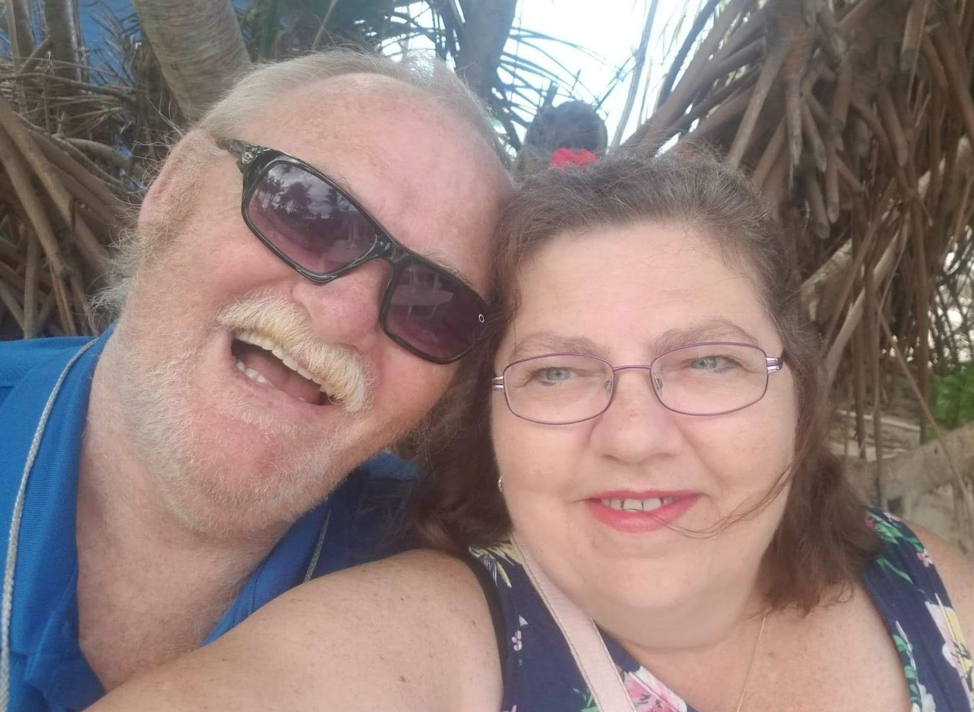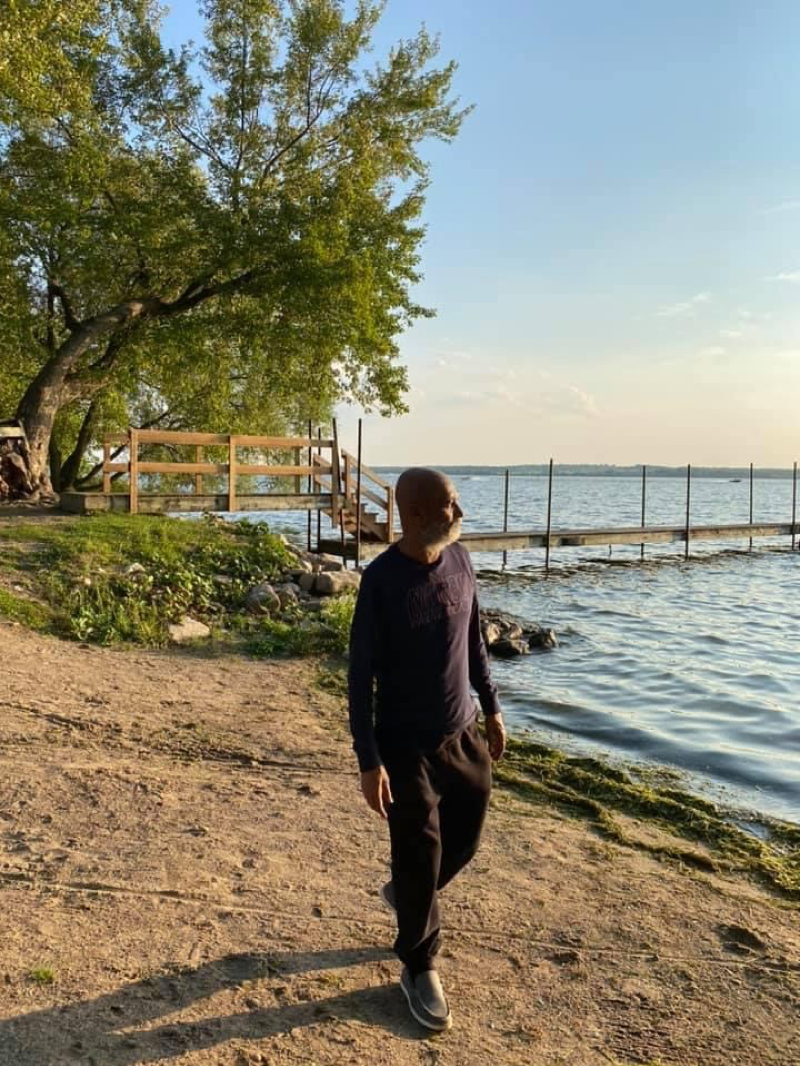‘It’s not a replacement for the real thing, being there in person, holding their hand, them hearing your voice’

Valerie Prendergast and her husband, Henry Dillon. (Courtesy Valerie Prendergast)
Oshawa resident Valerie Prendergast, 58, almost never went to bed without putting on her husband’s Old Spice deodorant. She sometimes started her mornings by applying it. The smell, (cloves and citrus) made her feel as if he was right beside her. Except he wasn’t. Henry Dillon, 61, was in a hospital bed that seemed to be an entire universe away — just like his mind seemed to be those days. He was in Lakeridge Health Oshawa for 78 days and his wife was only allowed to see him on occasions when it seemed like he wouldn’t survive the ravages of congestive heart failure and chronic obstructive pulmonary disease (COPD).
What Prendergast dealt with is the same difficult reality many others are now having to face. They have a sick parent, spouse, child, elderly relative or dear friend in the hospital, but cannot see them as a result of COVID-19. There’s the pain of not being there to comfort them when they are at their most vulnerable. And there’s the frustration and struggle of keeping in touch and dealing with seemingly overburdened hospital personnel to find out about the patient’s condition. It’s a battle and shots are fired from every direction, with no sign of victory in sight.
“It’s like the worst thing anyone can imagine. Someone they love is really sick in the hospital, on the ventilator and also battling a medical condition,” says Diana Brecher, a clinical psychologist, as well as a scholar-in-residence for positive psychology at Ryerson University.
“This sounds like a place where you want to find some hope and it’s probably very difficult to do that,” she says.
I know what Brecher means because my father was in the critical care unit of Lakeridge Health Oshawa for just over two months before he passed away, in February, from Stage 4 lung cancer. During his hospital stay, life became more difficult than it ever was before. It was a constant struggle to be by his side, virtually, in his last days. It was a mission every day to connect with him electronically. Chat links didn’t work, video wouldn’t connect and Wi-Fi would go down.

Naveed Kasem, who passed away after two months in the Critical Care Unit. (Mariam Kasem/Ryersonian)
Even then, as I was writing this, my connection with him on the iPad disconnected two minutes into the call my family had been trying to make work all day. The nurse looking after him told me she was too busy to deal with the call not working, so we wouldn’t be able to see him for the rest of the night. The thought that he may not understand what’s going on and conclude that we don’t want to talk to him was all that was on my mind.
Prendergast faced similar problems — each day posing a new uphill battle.
“It’s a complete roller-coaster. One day, you’re down at the very bottom and the next day, you’re at the very top,” Prendergast says. “You cannot see what’s coming at all.”
The roller-coaster is dependent on who the health-care workers are, not just his health, Prendergast says.
“Every time the doctors change, I don’t know if they try to be the hero to solve the problem, or whatever, but it feels like they start back at square two, instead of square 12 where we already were,” she says.
On the rare occasions when Prendergast got to visit her husband, she made her home beside him, in the often windowless room, for the one hour she could be with him.
On an early visit, she brought along three printed laminated posters: one is a picture of the two of them together, another is a photo of their five kids, and the last one shows images of their grandchildren. She taped the pictures onto the wall in front of him, so he could see, and told him about who each person was, as he often couldn’t remember due to COPD. She held his hand, which had new bruises on it, and tried to remind him of his bearings because, after over a month on a ventilator, delirium was taking hold. It felt like he was not there with her — even when he was.
“It was like he was off in some other land, staring at the ceiling, and his eyes darting back and forth, scared half the time,” she says.
It didn’t help that he was alone, touch-deprived and unable to see his family beyond an iPad screen every day.
Research shows the benefits of healing through touch. Human touch helps in recovery for many types of patients.
“It’s very different having that tactile experience, being able to hold and touch a relative. You don’t have that with a device,” says Paul Taylor, who, until November 2020, was a patient navigation adviser at Sunnybrook Health Sciences Centre.
“It’s not a replacement for the real thing, being there in person, holding their hand, them hearing your voice,” he says.
Katherine Boudreau, a creative industries student at Ryerson, went through the painful experience of having a sick loved one in the hospital when her grandfather was hospitalized for 72 hours. Her grandfather, who is 92, was taken to a hospital in Ottawa for breathing problems in December 2020 and was alone for his entire stay. Boudreau says her family was unable to contact her grandfather to know what was wrong. Once he was discharged, the hospital still did not tell the family what was wrong with Boudreau’s grandfather.
“There was no way that I could see a positive side of things if I didn’t know what was happening,” she says about her grandfather’s stay in the hospital.
Just like Boudreau, many people in a similar situation feel hopeless and find it hard to imagine the glass half full.
Brecher says self-care should be a priority for those going through this.
“There’s a choice. You can focus on all the things that aren’t going well or you can focus on the glimmers of light that are, so even when it’s really dark, there might be some pockets of hope,” she says.
For her part, Prendergast found hope in thinking about something her husband said.
“My husband made a promise to my granddaughter that he was gonna dance at her wedding. And I believe in that,” she says.
Thankfully, Prendergast’s husband survived his hospital ordeal, and is now recovering at home with his wife. During his absence, Prendergast says it was memories of her husband, surrounding her everywhere and making her feel as if he was there — even when he wasn’t — that gave her comfort, though she couldn’t be with him.
While her husband was in the hospital, Prendergast would run her robot vacuum and laugh because her husband was convinced it was after him. When she was cooking a hearty shepherd’s pie or chicken quesadilla in her snug kitchen, she would think, “he will be pissed when he finds out I made that.”
Mariam Kasem
This article may have been created with the use of AI tools such as
